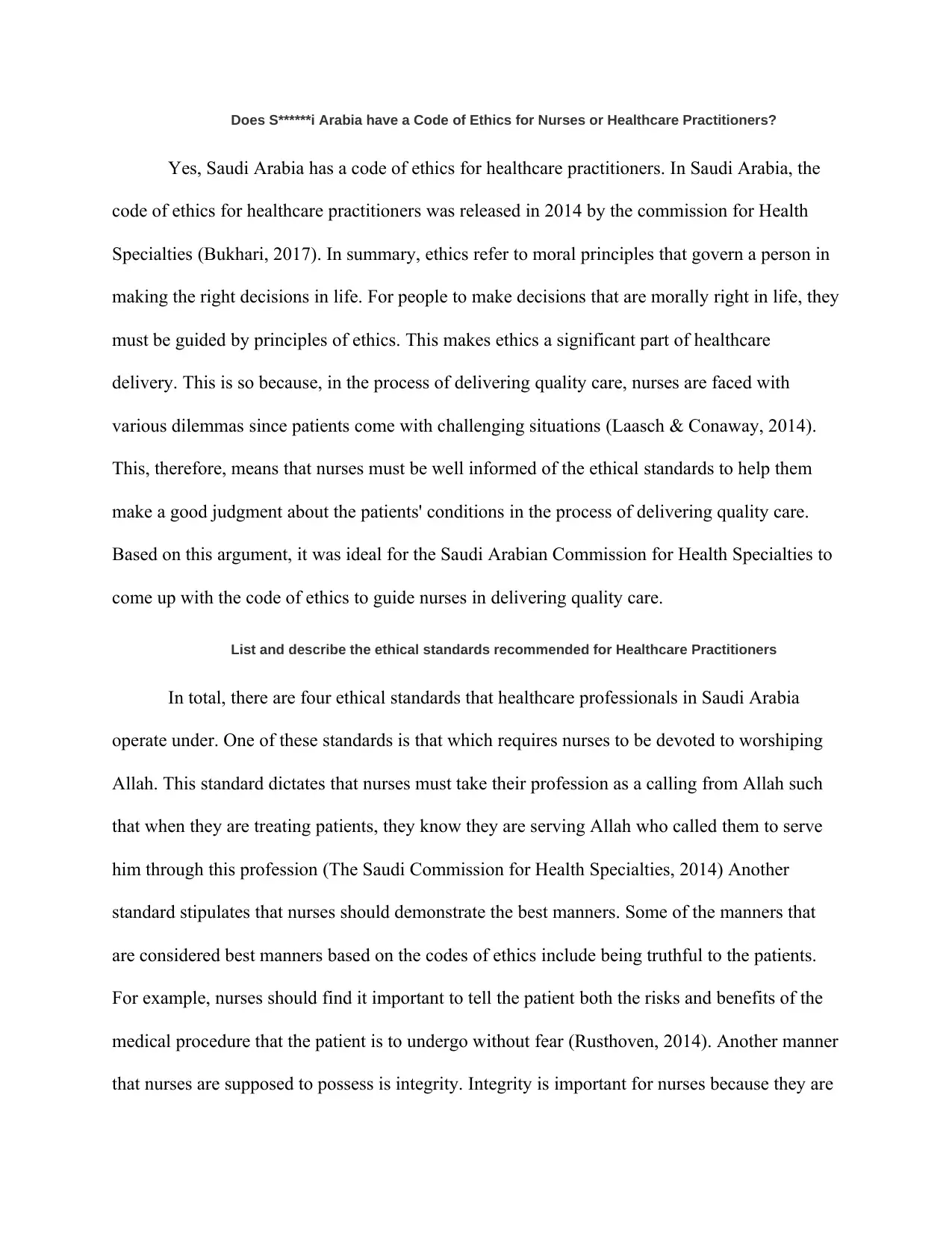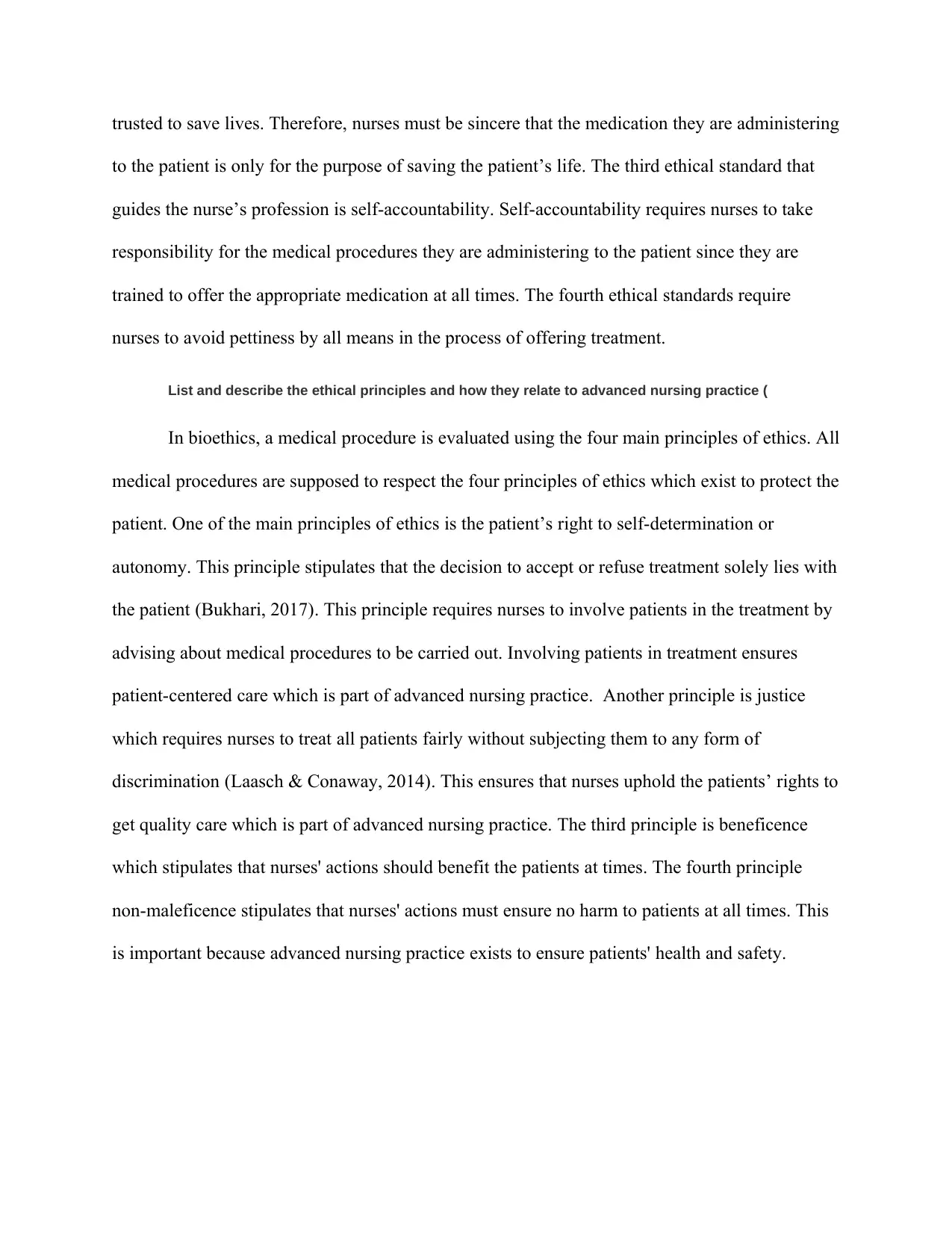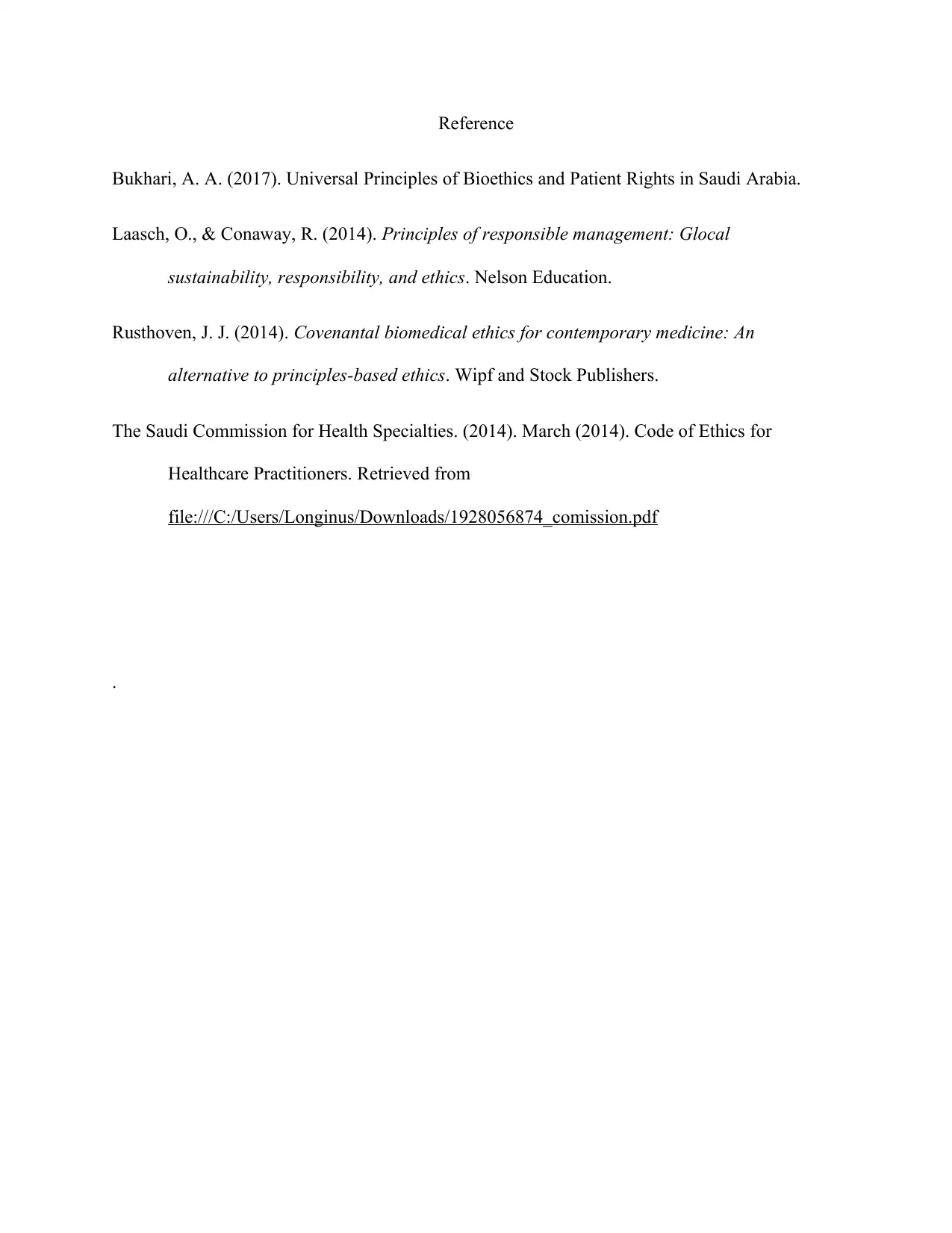Ethical Standards and Principles in Saudi Arabian Healthcare - Report
VerifiedAdded on 2022/09/29
|3
|819
|21
Report
AI Summary
This report provides an overview of the code of ethics for healthcare practitioners in Saudi Arabia, released in 2014. It emphasizes the importance of ethics in healthcare, especially in challenging patient situations. The report outlines four ethical standards for healthcare professionals: devotion to worship, best manners, self-accountability, and avoidance of pettiness. It also discusses four ethical principles (autonomy, justice, beneficence, and non-maleficence) and their relationship to advanced nursing practice, ensuring patient rights and quality care. The report references the Saudi Commission for Health Specialties and relevant literature on bioethics and patient rights.

Does S******i Arabia have a Code of Ethics for Nurses or Healthcare Practitioners?
Yes, Saudi Arabia has a code of ethics for healthcare practitioners. In Saudi Arabia, the
code of ethics for healthcare practitioners was released in 2014 by the commission for Health
Specialties (Bukhari, 2017). In summary, ethics refer to moral principles that govern a person in
making the right decisions in life. For people to make decisions that are morally right in life, they
must be guided by principles of ethics. This makes ethics a significant part of healthcare
delivery. This is so because, in the process of delivering quality care, nurses are faced with
various dilemmas since patients come with challenging situations (Laasch & Conaway, 2014).
This, therefore, means that nurses must be well informed of the ethical standards to help them
make a good judgment about the patients' conditions in the process of delivering quality care.
Based on this argument, it was ideal for the Saudi Arabian Commission for Health Specialties to
come up with the code of ethics to guide nurses in delivering quality care.
List and describe the ethical standards recommended for Healthcare Practitioners
In total, there are four ethical standards that healthcare professionals in Saudi Arabia
operate under. One of these standards is that which requires nurses to be devoted to worshiping
Allah. This standard dictates that nurses must take their profession as a calling from Allah such
that when they are treating patients, they know they are serving Allah who called them to serve
him through this profession (The Saudi Commission for Health Specialties, 2014) Another
standard stipulates that nurses should demonstrate the best manners. Some of the manners that
are considered best manners based on the codes of ethics include being truthful to the patients.
For example, nurses should find it important to tell the patient both the risks and benefits of the
medical procedure that the patient is to undergo without fear (Rusthoven, 2014). Another manner
that nurses are supposed to possess is integrity. Integrity is important for nurses because they are
Yes, Saudi Arabia has a code of ethics for healthcare practitioners. In Saudi Arabia, the
code of ethics for healthcare practitioners was released in 2014 by the commission for Health
Specialties (Bukhari, 2017). In summary, ethics refer to moral principles that govern a person in
making the right decisions in life. For people to make decisions that are morally right in life, they
must be guided by principles of ethics. This makes ethics a significant part of healthcare
delivery. This is so because, in the process of delivering quality care, nurses are faced with
various dilemmas since patients come with challenging situations (Laasch & Conaway, 2014).
This, therefore, means that nurses must be well informed of the ethical standards to help them
make a good judgment about the patients' conditions in the process of delivering quality care.
Based on this argument, it was ideal for the Saudi Arabian Commission for Health Specialties to
come up with the code of ethics to guide nurses in delivering quality care.
List and describe the ethical standards recommended for Healthcare Practitioners
In total, there are four ethical standards that healthcare professionals in Saudi Arabia
operate under. One of these standards is that which requires nurses to be devoted to worshiping
Allah. This standard dictates that nurses must take their profession as a calling from Allah such
that when they are treating patients, they know they are serving Allah who called them to serve
him through this profession (The Saudi Commission for Health Specialties, 2014) Another
standard stipulates that nurses should demonstrate the best manners. Some of the manners that
are considered best manners based on the codes of ethics include being truthful to the patients.
For example, nurses should find it important to tell the patient both the risks and benefits of the
medical procedure that the patient is to undergo without fear (Rusthoven, 2014). Another manner
that nurses are supposed to possess is integrity. Integrity is important for nurses because they are
Paraphrase This Document
Need a fresh take? Get an instant paraphrase of this document with our AI Paraphraser

trusted to save lives. Therefore, nurses must be sincere that the medication they are administering
to the patient is only for the purpose of saving the patient’s life. The third ethical standard that
guides the nurse’s profession is self-accountability. Self-accountability requires nurses to take
responsibility for the medical procedures they are administering to the patient since they are
trained to offer the appropriate medication at all times. The fourth ethical standards require
nurses to avoid pettiness by all means in the process of offering treatment.
List and describe the ethical principles and how they relate to advanced nursing practice (
In bioethics, a medical procedure is evaluated using the four main principles of ethics. All
medical procedures are supposed to respect the four principles of ethics which exist to protect the
patient. One of the main principles of ethics is the patient’s right to self-determination or
autonomy. This principle stipulates that the decision to accept or refuse treatment solely lies with
the patient (Bukhari, 2017). This principle requires nurses to involve patients in the treatment by
advising about medical procedures to be carried out. Involving patients in treatment ensures
patient-centered care which is part of advanced nursing practice. Another principle is justice
which requires nurses to treat all patients fairly without subjecting them to any form of
discrimination (Laasch & Conaway, 2014). This ensures that nurses uphold the patients’ rights to
get quality care which is part of advanced nursing practice. The third principle is beneficence
which stipulates that nurses' actions should benefit the patients at times. The fourth principle
non-maleficence stipulates that nurses' actions must ensure no harm to patients at all times. This
is important because advanced nursing practice exists to ensure patients' health and safety.
to the patient is only for the purpose of saving the patient’s life. The third ethical standard that
guides the nurse’s profession is self-accountability. Self-accountability requires nurses to take
responsibility for the medical procedures they are administering to the patient since they are
trained to offer the appropriate medication at all times. The fourth ethical standards require
nurses to avoid pettiness by all means in the process of offering treatment.
List and describe the ethical principles and how they relate to advanced nursing practice (
In bioethics, a medical procedure is evaluated using the four main principles of ethics. All
medical procedures are supposed to respect the four principles of ethics which exist to protect the
patient. One of the main principles of ethics is the patient’s right to self-determination or
autonomy. This principle stipulates that the decision to accept or refuse treatment solely lies with
the patient (Bukhari, 2017). This principle requires nurses to involve patients in the treatment by
advising about medical procedures to be carried out. Involving patients in treatment ensures
patient-centered care which is part of advanced nursing practice. Another principle is justice
which requires nurses to treat all patients fairly without subjecting them to any form of
discrimination (Laasch & Conaway, 2014). This ensures that nurses uphold the patients’ rights to
get quality care which is part of advanced nursing practice. The third principle is beneficence
which stipulates that nurses' actions should benefit the patients at times. The fourth principle
non-maleficence stipulates that nurses' actions must ensure no harm to patients at all times. This
is important because advanced nursing practice exists to ensure patients' health and safety.

Reference
Bukhari, A. A. (2017). Universal Principles of Bioethics and Patient Rights in Saudi Arabia.
Laasch, O., & Conaway, R. (2014). Principles of responsible management: Glocal
sustainability, responsibility, and ethics. Nelson Education.
Rusthoven, J. J. (2014). Covenantal biomedical ethics for contemporary medicine: An
alternative to principles-based ethics. Wipf and Stock Publishers.
The Saudi Commission for Health Specialties. (2014). March (2014). Code of Ethics for
Healthcare Practitioners. Retrieved from
file:///C:/Users/Longinus/Downloads/1928056874_comission.pdf
.
Bukhari, A. A. (2017). Universal Principles of Bioethics and Patient Rights in Saudi Arabia.
Laasch, O., & Conaway, R. (2014). Principles of responsible management: Glocal
sustainability, responsibility, and ethics. Nelson Education.
Rusthoven, J. J. (2014). Covenantal biomedical ethics for contemporary medicine: An
alternative to principles-based ethics. Wipf and Stock Publishers.
The Saudi Commission for Health Specialties. (2014). March (2014). Code of Ethics for
Healthcare Practitioners. Retrieved from
file:///C:/Users/Longinus/Downloads/1928056874_comission.pdf
.
⊘ This is a preview!⊘
Do you want full access?
Subscribe today to unlock all pages.

Trusted by 1+ million students worldwide
1 out of 3
Related Documents
Your All-in-One AI-Powered Toolkit for Academic Success.
+13062052269
info@desklib.com
Available 24*7 on WhatsApp / Email
![[object Object]](/_next/static/media/star-bottom.7253800d.svg)
Unlock your academic potential
Copyright © 2020–2026 A2Z Services. All Rights Reserved. Developed and managed by ZUCOL.





